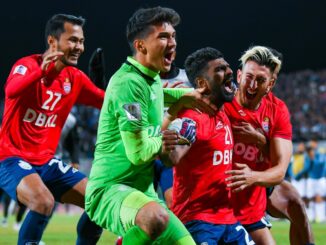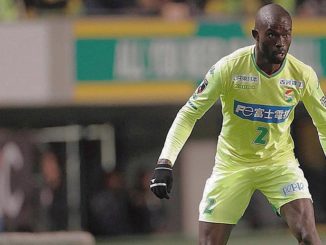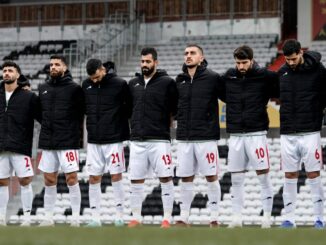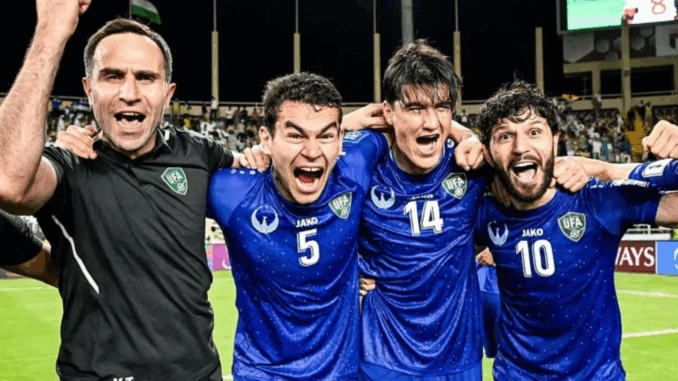
After so much heartbreak, and after so many near misses, Uzbekistan are going to the FIFA World Cup.
It’s a sentence that just feels good to write down, and even better to say.
Uzbekistan are going to the FIFA World Cup. If ever a nation deserved qualification, and the euphoria that comes with it, it’s Uzbekistan.
With the blow of the referee’s whistle at the end of a nervy night in Abu Dhabi last week, the pain of the past was washed away in an instant, replaced by emotions of a different kind: relief, ecstasy, unbridled joy and tears of happiness. So many tears.
Goalkeeper Utkir Yusupov, who was instrumental throughout the campaign, couldn’t contain his emotions as he slumped to the turf at Al Nahyan Stadium.
Veteran midfielder Otabek Shukurov choked back tears as he spoke post-game of what the moment means.
“Previously, we were crying because we couldn’t qualify. Now we are crying because we qualified,” he said just moments after full-time.
“But it’s not only the players who achieved, it’s an achievement that must be shared with others, especially with the fans, with the coaches, with everyone, but especially with the fans.”
There was no holding back the tears when he went up into the stands to greet his father. He later explained that his father used to pray for Uzbekistan to qualify for the World Cup, and those dreams are now a reality.
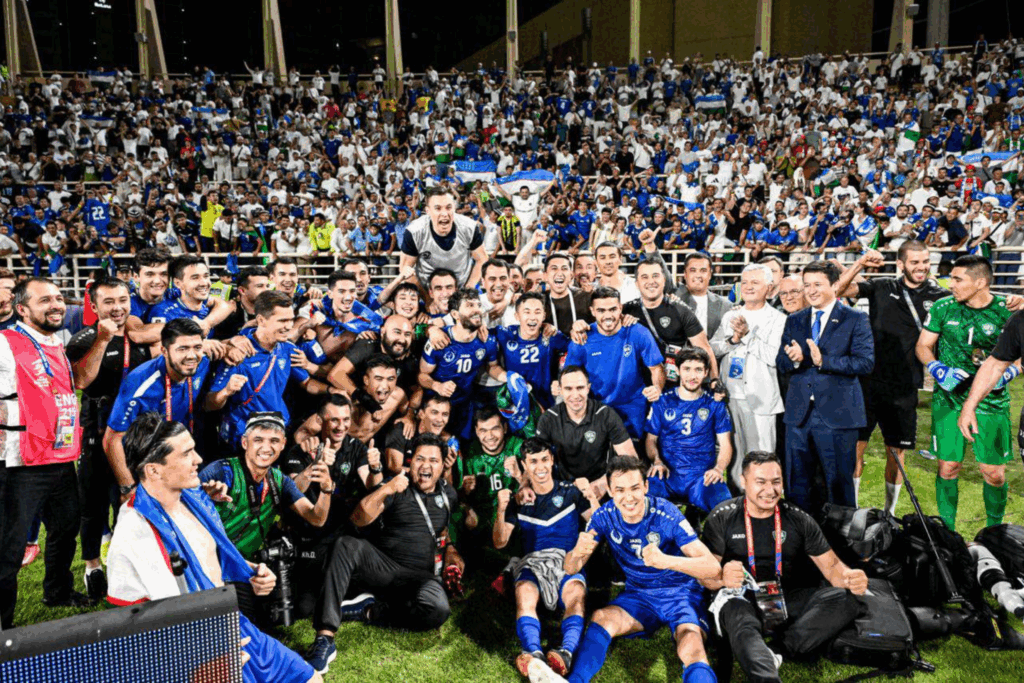
The demons of the past have been banished, consigned to the books of history as Uzbekistan comes of age.
It caps an incredible 12 months for Uzbek football after the country qualified for and played at their first ever Olympic Games in Paris, while Abdukodir Khusanov became the first Uzbek player to sign for a Premier League club when he was snapped up by giants Manchester City in January.
But this has been a journey more than 12 months in the making. The origins of this story go even further back, but that is also when the years of heartbreak began after such a promising start.
From the moment Uzbekistan joined AFC as an independent nation following the break up of the Soviet Union, there were signs that they would become a serious force within Asian football.
At their first major tournament, the Asian Games in 1994, they swept all before them to claim the Gold Medal, defeating China 4-2 in the final. But despite their obvious potential, that was as good as it got.
Qualifying for France 1998 saw them fall well short, with just one win from eight matches. Qualifying for Japan-Korea 2002 saw them fall one point short of the playoffs after squandering a 2-0 lead against Oman in the penultimate game, losing 4-2.
They came up short again in 2006, losing out to Saudi Arabia and Korea Republic, in the Third Round and then losing out to Bahrain on away goals after a controversial playoff that saw the first game annulled and replayed.
Around the same time a different project was emerging in Uzbekistan, in club football, that threatened to elevate Uzbek football to a whole new level.
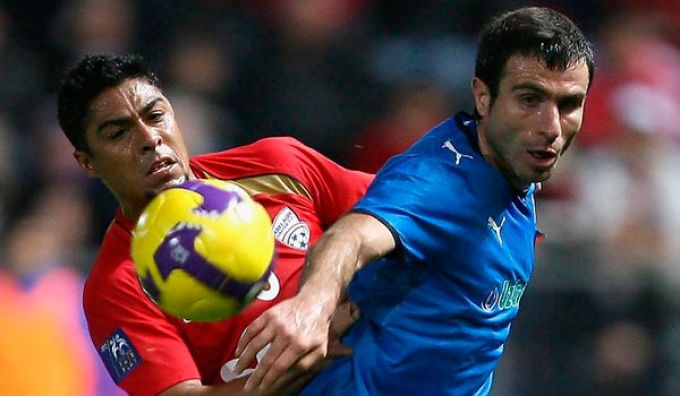
Bunyodkor, bankrolled by state conglomerate Zeromax, emerged seemingly from nowhere to challenge the established football order in Asia, signing Brazilian legend Rivaldo, as well as Zico and Luis Felipe Scolari as coaches.
Samuel Eto’o was even linked with the club for an eye-watering amount, rumoured to be $25 million, before turning down their advances.
It burned brightly, but quickly, and within the space of a few years the project had largely collapsed. While Bunyodkor dominated Uzbek football for that period, they almost went out of business within a decade. Their last title came back in 2013, and their status as Uzbekistan’s premier club has been taken by Tashkent rivals, Pakhtakor.
“These were golden times,” Kapadze recalled to The Asian Game through an interpreter.
“I have very good memories (of Bunyodkor). The club did everything to develop the club, develop the academy and develop football in the country.”
While their club football threatened to reach for the stars, the fortunes of the national team went the other way. They were nowhere near it for 2010, finishing last in their group with just one win, but after this is when the real pain would strike.
In 2014, they entered the final window of three games sitting top of the group, albeit having played a game extra than both Iran and Korea. They finished it in third, missing out on automatic qualification on goal difference to Korea.
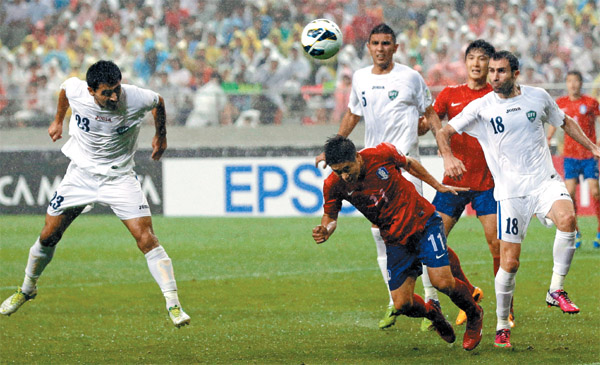
To make matters worse, Korea had only beaten them a week earlier in the penultimate game thanks to a cruel own-goal from Akmal Shorakhmedov. In the final playoff against Jordan, they lost out 9-8 on penalties.
There was worse to come for Russia 2018. Once again it would come down to the final window of matches, and this time they were in third, which would be enough for another intra-continental playoff.
A 1-0 loss to China in the dying minutes in their opening game put them on the back foot, but they finished the campaign at home to Korea knowing a win would see them qualify. A 0-0 draw was not what they needed, but would’ve been enough to secure third and a playoff with Australia, so long as Syria lost to Iran in Tehran.
They looked home with Iran leading 2-1 deep into stoppage time, but Omar Al-Somah’s 93rd minute equaliser saw them jump ahead of Uzbekistan… on goal difference, again.
Uzbekistan had found new ways to snatch defeat from the jaws of victory. The pain of missing out again was raw and cut deep and took years to recover, so much so they missed the final round of qualifying for 2022 entirely.
But it was, with the benefit of hindsight, perhaps a blessing in disguise. It forced some introspection and a change in focus. Four years later they’re off to the World Cup.

It’s been a stunning resurrection for the White Wolves, built on the back of the next ‘golden generation’ headlined by the likes of Khusanov, Eldor Shomurodov, and Abbosbek Fayzullaev.
Fayzullaev, who plays his club football in Russia, spoke to The Asian Game back in 2023 and promised this generation would “play the best football Uzbekistan has ever seen.”
“It’s time for us to reach the World Cup,” Fayzullaev told The Asian Game Podcast.
“The system of the Uzbek football now is developing – the structures, the stadiums, the training sessions, everything’s going well. I think we will reach the World Cup in 2026 in America.
“I am very optimistic with what’s coming for Uzbekistan in the future because there is so much talent. I have confidence that Uzbek football is in a good hands, because with these talents, I think we will play the best football that Uzbekistan will ever play.”
Whether it’s the ‘best’ is open for debate, beauty is in the eye of the beholder, after all, but it is certainly the most successful. What has been most striking and pleasing is that this generation isn’t burdened by the failures of the past.
The monkey on their backs grew into a silverback gorilla, and it would be easy to allow history to weigh you down. But this generation embraced the challenge.
There were many times in this campaign where the ‘old’ Uzbekistan could’ve reared its head and directed them off course, like after losing to Qatar in the 12th minute of stoppage time.
But rather than let that derail them, they backed it up with a 1-0 win over DPR Korea in Laos to remain on track. Not even losing their coach, Srecko Katanec, to serious health issues could divert them. Former national team star, Timur Kapadze, who had experienced all the heartbreak as a player, stepped in and the entire program barely skipped a beat.
It epitomises this new era of Uzbek football, where system and structure trumps the individual.
It speaks to a new attitude in Uzbek football. There’s a confidence and boldness about everything they do. From the way they play, to hosting FIFA tournaments and bidding for the AFC Asian Cup. They know who they are and where they’re going.
Three decades on from their Asian Games success, they finally appear ready to take their place at the top of Asian football.


